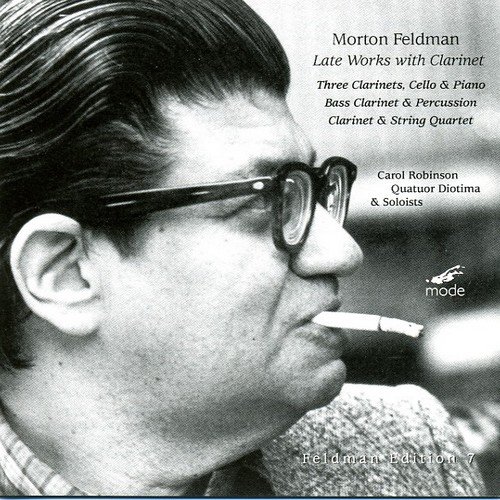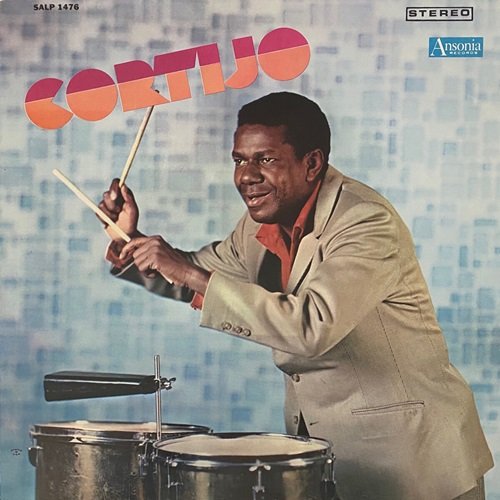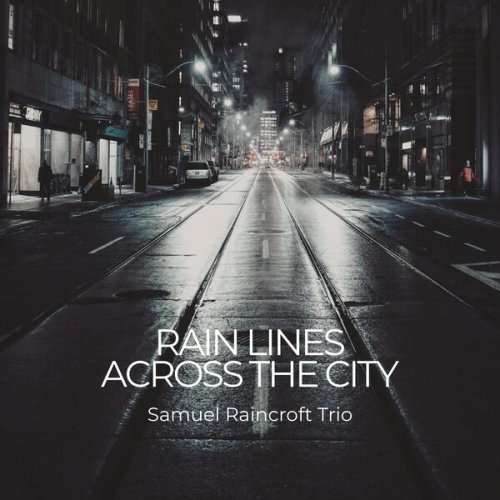Carol Robinson, Quatuor Diotima & Soloists - Morton Feldman - Late Works with Clarinet (2003)

Artist: Carol Robinson, Quatuor Diotima & Soloists
Title: Morton Feldman - Late Works with Clarinet
Year Of Release: 2003
Label: Mode
Genre: Classical
Quality: FLAC (tracks+.cue,log)
Total Time: 01:09:29
Total Size: 237 Mb
WebSite: Album Preview
Tracklist: Title: Morton Feldman - Late Works with Clarinet
Year Of Release: 2003
Label: Mode
Genre: Classical
Quality: FLAC (tracks+.cue,log)
Total Time: 01:09:29
Total Size: 237 Mb
WebSite: Album Preview
1. Three Clarinets, Cello And Piano 9:33
Carol Robinson, Olivier Voize, Pierre Dutrieu, clarinets
Elena Andreyev, cello
Vincent Leterme, piano
2. Bass Clarinet And Percussion 17:30
Carol Robinson, bass clarinet
Françoise Rivalland, Peppie Wiersma, percussion
3. Clarinet And String Quartet 42:20
Carol Robinson, clarinet
Strings - Quatuor Diotima:
Pierre Morlet, cello
Franck Chevalier, viola
Eiichi Chijiiwa, Nicolas Miribel, violins
One of the characteristics of Morton Feldman's music is the way silences are thrown into stark relief. Each silence - freighted with memory, charged with expectation - becomes a unique presence in the music more than merely an absence of it. Though his silences are measured in units of time, they also contain an intimation of infinity. The music of the "classical" tradition slows down, speeds up, layers and otherwise manipulates time. Of the other arts, only cinema plays with our temporal perception to a greater degree. But we've come so accustomed to this happening that we hardly notice it. Feldman's music, especially that of his later years, more nearly approximates the quotidian time of which we're only fleetingly aware. If his music seems strange, it's not because it employs the temporal distortions to which we've become accustomed but, on the contrary, because it doesn't.
Feldman takes three slightly different approaches to time and silences in Late works with Clarinet. Either by luck or calculation, these roughly coincide with the major developments in his music. In Three Clarinets, Cello & Piano (1971), a piece that sums up the achievements of his early career, the sounds are freefloating and unpredictable, a series of seemingly random but beautifully configured musical events. Written a decade later, Bass Clarinet & Percussion has a chiming ritualistic quality; the music is episodic, slyly repetitious, simultaneously lulling and disruptive. By comparison, Clarinet & String Quartet (1983), although nakedly repetitious, employs the subtle thwarting of expectation that is so typical of the compositions of Feldman's last five years. Here silence is woven through the sounds, creating a flexible, airy matrix. Clarinettist Carol Robinson, the Quatuor Diotima, and the other instrumentalists involved in this production have avoided one of the bugbears of recent Feldman performances: Mozartisation, where the sheer sonic beauty of a work is over-emphasized, and insufficient attention is paid to the other aspects. But throughout Late works with Clarinet things are just as they should be. --- Brian Marley
Feldman takes three slightly different approaches to time and silences in Late works with Clarinet. Either by luck or calculation, these roughly coincide with the major developments in his music. In Three Clarinets, Cello & Piano (1971), a piece that sums up the achievements of his early career, the sounds are freefloating and unpredictable, a series of seemingly random but beautifully configured musical events. Written a decade later, Bass Clarinet & Percussion has a chiming ritualistic quality; the music is episodic, slyly repetitious, simultaneously lulling and disruptive. By comparison, Clarinet & String Quartet (1983), although nakedly repetitious, employs the subtle thwarting of expectation that is so typical of the compositions of Feldman's last five years. Here silence is woven through the sounds, creating a flexible, airy matrix. Clarinettist Carol Robinson, the Quatuor Diotima, and the other instrumentalists involved in this production have avoided one of the bugbears of recent Feldman performances: Mozartisation, where the sheer sonic beauty of a work is over-emphasized, and insufficient attention is paid to the other aspects. But throughout Late works with Clarinet things are just as they should be. --- Brian Marley
![The Boss Ensemble - Circuits Hybrides (2019) [Hi-Res] The Boss Ensemble - Circuits Hybrides (2019) [Hi-Res]](https://www.dibpic.com/uploads/posts/2019-11/1574517391_folder.jpg)


![Whatever Happens Don't Be Yourself! - Tales of No Consequence (2026) [Hi-Res] Whatever Happens Don't Be Yourself! - Tales of No Consequence (2026) [Hi-Res]](https://img.israbox.com/img/2026-02/27/6usdiy5oinb96d1lfeldes4eg.jpg)




